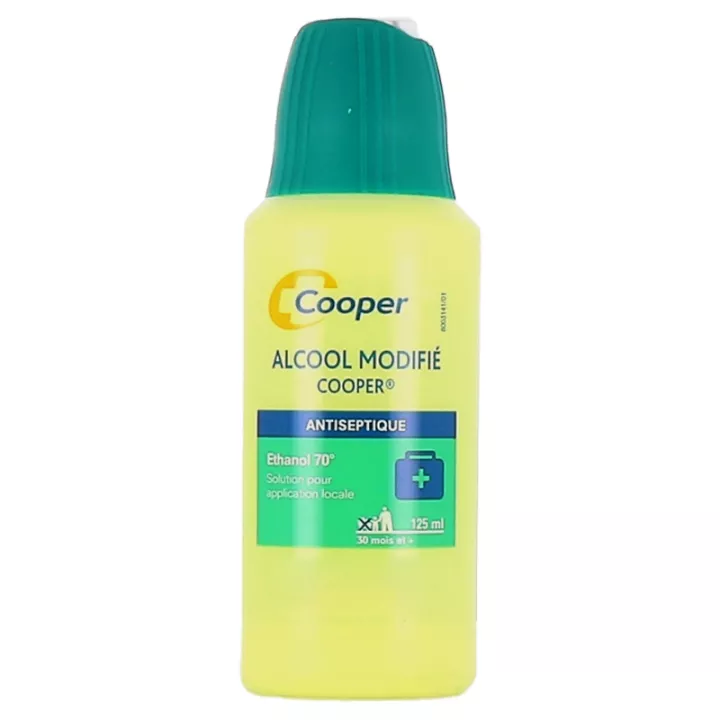NOTICE
ANSM - Last updated: 12/04/2011
Name of the medicinal product
ALCOHOL MODIFIED COOPER, solution for skin application
framed
Read all of this leaflet carefully before you start using this medicine.
a) This medication is a specialty AUTOMATICATION which can be used without consultation or prescription from a doctor.
(b) The persistence of symptoms, aggravation or the appearance of new disorders require medical advice.
c) Keep this leaflet, you may need to read it again.
d) If you need more information and advice, ask your pharmacist.
e) If any of the side effects gets serious, or if you notice any side effects not listed in this leaflet, please tell your doctor or pharmacist.
Review summary
In this notice :
1. WHAT IS MODIFIED ALCOHOL COOPER, a dermal application solution AND IN WHAT CASES IS IT USED?
2. BEFORE YOU USE ALCOHOL MODIFIED COOPER, solution for skin application?
3. HOW TO USE MODIFIED ALCOHOL COOPER, solution for skin application?
4. WHAT ARE POSSIBLE SIDE EFFECTS?
5. HOW TO STORE ALCOHOL MODIFIED COOPER, solution for skin application?
6. ADDITIONAL INFORMATION
1. WHAT IS MODIFIED ALCOHOL COOPER, a dermal application solution AND IN WHAT CASES IS IT USED?
Pharmacotherapeutic group
This medication is an antiseptic.
Therapeutic indications
It is used to disinfect healthy skin and shallow superficial wounds.
2. BEFORE YOU USE ALCOHOL MODIFIED COOPER, solution for skin application?
List of information needed before taking the medication
Not applicable.
Cons-indications
Do not use ALCOHOL MODIFIED COOPER, solution for skin application:
· In application on the mucous membranes.
· If you are allergic to any of the components, especially tartrazine, especially in people allergic to aspirin.
· In infants less than 30 months of age and children with convulsions due to fever (due to the presence of terpene derivatives: camphor).
If in doubt, it is essential to seek the advice of your doctor or pharmacist.
Precautions for use; special warnings
Take special care with ALCOHOL MODIFIED COOPER, solution for skin application:
Special warnings
· Reserved for external use.
· Do not swallow, do not inject.
· Alcohol should not be used for the practice of alcohol.
· Observe the instructions for use:
o never apply a dose higher than recommended, ( see Dosage ),
o do not apply over an extended surface of the body,
o respect the recommended frequency and duration of treatment.
Precautions for use
· In case of epilepsy old or recent, REQUEST ADVICE TO YOUR DOCTOR.
· Under the recommended conditions of use, this drug does not penetrate the skin. However, caution should be exercised when repeated use is made on a large area, under an occlusive dressing, on injured skin (particularly burned skin).
· Avoid use near a flame.
If in doubt, it is essential to seek the advice of your doctor or pharmacist.
Interaction with other medicines
Use of other medicines
Given the possible interferences (antagonism, inactivation), the simultaneous or successive use of antiseptics should be avoided.
If you are taking or have recently taken any other medicines, including medicines obtained without a prescription, talk to your doctor or pharmacist.
Interactions with food and beverages
Not applicable.
Interactions with Herbal Medicines or Alternative Therapies
Not applicable.
Use during pregnancy and lactation
Pregnancy and breast feeding
In case of breast-feeding, it is preferable not to use this medication and in no case should it be applied to the breasts.
Ask your doctor or pharmacist for advice before taking any medicine.
Sport
Not applicable.
Effects on ability to drive or use machines
Not applicable.
List of excipients with known effect
Not applicable.
3. HOW TO USE MODIFIED ALCOHOL COOPER, solution for skin application?
Instructions for proper use
Not applicable.
Dosage, Mode and / or route (s) of administration, Frequency of administration and Duration of treatment
Dosage
Two local applications per day on average:
· either by pouring the solution directly onto the part to be treated,
· either with the aid of a solution-impregnated pad,
· or by the placement of wet dressings soaked in solution.
Administration mode
Dermal.
Symptoms and Instructions for Overdose
Not applicable.
Instructions for omission of one or more doses
Not applicable.
Risk of withdrawal syndrome
Not applicable.
4. WHAT ARE POSSIBLE SIDE EFFECTS?
Description of adverse reactions
Like all medicines, ALCOHOL MODIFIED COOPER, a solution for skin application, is likely to have undesirable effects, although not everyone is subject to it.
· Allergy to the skin.
· Frequent application can cause irritation and dryness of the skin.
· Due to the presence of terpene derivatives (camphor) and in case of non-respect of recommended doses: possibilities of agitation, confusion in the elderly, risk of convulsions in the infant and the child.
IN ALL THESE CASES, PREVENT YOUR DOCTOR.
If you notice any side effects not listed in this leaflet, or if any of the side effects gets serious, contact your doctor or pharmacist.
5. HOW TO STORE ALCOHOL MODIFIED COOPER, solution for skin application?
Keep out of the reach and sight of children.
Expiration date
Do not use ALCOHOL MODIFIED COOPER, a dermal application solution after the expiry date which is stated on the vial. The expiry date refers to the last day of the month.
Storage conditions
Close the bottle after use.
Flammable product, to be stored away from heat sources.
If necessary, warnings against visible signs of deterioration
Medicines should not be disposed of via wastewater or household waste. Ask your pharmacist what to do with unused medications. These measures will help protect the environment.
6. ADDITIONAL INFORMATION
Full list of active substances and excipients
What does ALCOOL MODIFIE COOPER, solution for skin application contain?
The active substance is:
Ethanol at 70% (v / v) ......................................... .................................................. ...................... qsp 100 ml
For 100 ml of solution.
The other components are:
Synthetic camphor, tartrazine (E102).
Pharmaceutical form and content
What is ALCOOL MODIFIE COOPER, solution for skin application and contents of the outer packaging?
This medication is in the form of a solution for skin application.
60 ml, 90 ml, 125 ml, 250 ml, 500 ml and 1000 ml flasks.
Not all pack sizes may be marketed.
Name and address of the marketing authorization holder and the holder of the manufacturing authorization responsible for the release of the lots, if different
Holder
FRENCH PHARMACEUTICAL COOPERATION
PLACE LUCIEN AUVERT
77020 MELUN CEDEX
LA FRANCE
exploiting
FRENCH PHARMACEUTICAL COOPERATION
PLACE LUCIEN AUVERT
77020 MELUN CEDEX
LA FRANCE
Maker
FRENCH PHARMACEUTICAL COOPERATION
PLACE LUCIEN AUVERT
77020 MELUN CEDEX
LA FRANCE
Names of the medicinal product in the Member States of the European Economic Area
Not applicable.
Date of approval of the notice
The last date on which this leaflet was approved is {date}.
AMM under exceptional circumstances
Not applicable.
Internet Information
Detailed information on this medicine is available on the Afssaps website (France).
Information for health professionals only
Not applicable.
Other
Not applicable.











